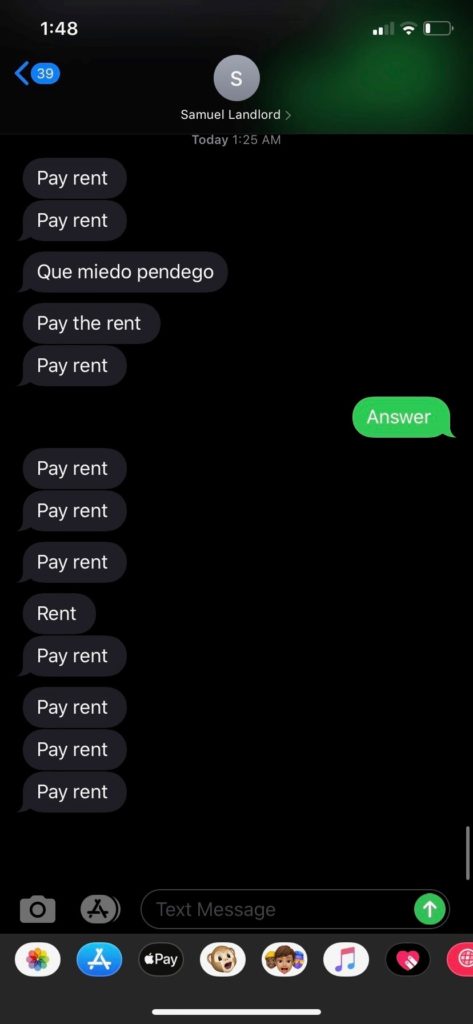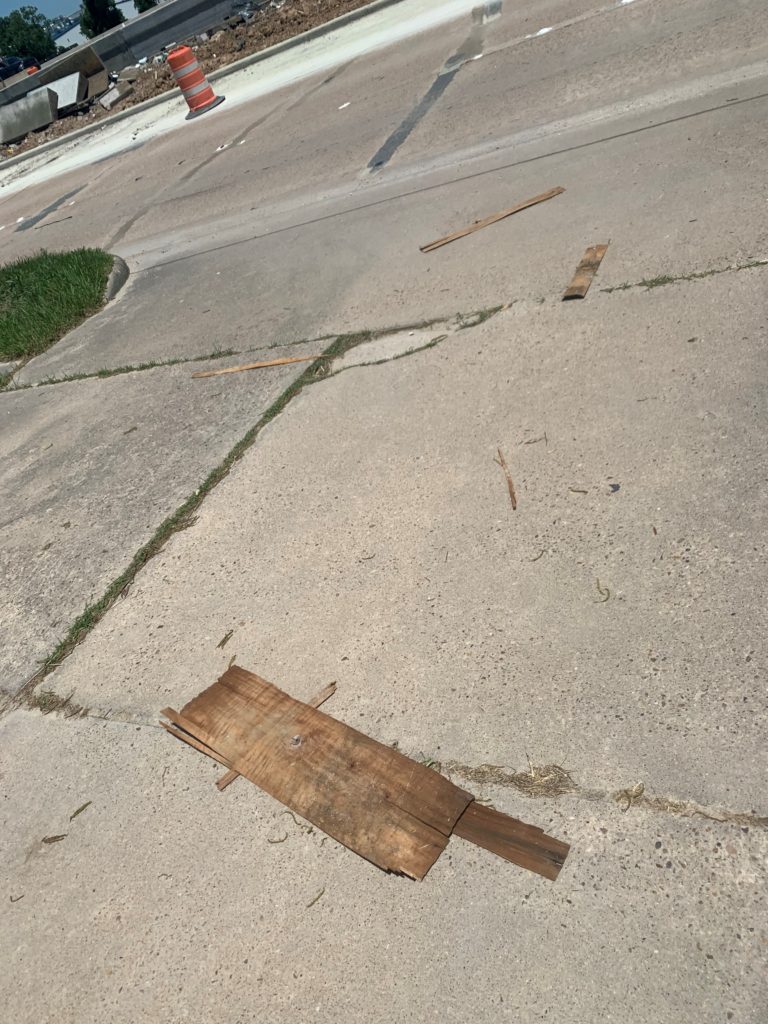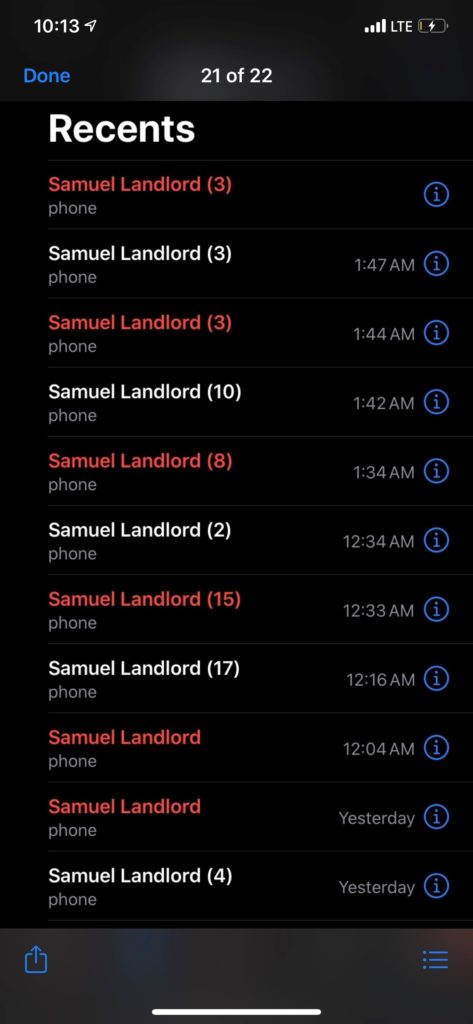Throughout the evening of April 3 and early morning hours of April 4, Kariza Goodie’s landlord called her and other family members 39 times ordering them to pay rent. The landlord had also been repeatedly calling Goodie’s partner, Chris Gaitan, interrupting the sleep of an essential on-call worker who does not have the luxury of silencing his phone at night.
The calls began on April 1, when 29-year-old Goodie, also a mother of two, was furloughed from her job as a sales associate at T-Mobile due to the COVID-19 pandemic’s effect on the economy. Goodie, who is her family’s primary breadwinner, had informed her landlord, Samuel Castillo, that day that she could not pay April’s rent on the Pasadena, Texas house she rents from him.
Castillo’s reaction to the news, according to court records and interviews, went well beyond the relentless phone calls — which have now totaled to 267 — including many actions that Castillo either knew or should have known were against the law. Goodie and her lawyers claim Castillo:

- Shut off the water and air conditioning to the house, including for an entire weekend in which the temperature hit 90 degrees at one point;
- Threw wooden boards with nails on the driveway, causing Goodie two flat tires;
- Entered the property without consent and throwing the family’s patio furniture in the trash;
- Threatened violence against his tenants — even showing up at the homes of Goodie and Gaitan’s family members — by demanding that rent be paid, “or else”;
- Stalked and followed Goodie and her children; and
- Texted Goodie and her mother-in-law Martha, who also lives in the house, that they should take up prostitution to collect the money for the rent.
Fortunately for Goodie, her lawyers stopped Castillo this week when a Harris County district judge entered a temporary restraining order against Castillo that bans him over the next 14 days from communicating with Goodie and her family members, entering the premises and shutting off the water. The judge also ordered Castillo to fix the HVAC unit once the family either replaces the air conditioning filter or submits proof that the filter is in working order, which the judge defined as no more than 90 days old.
“Nobody should act like this, nobody deserves to be treated like this, and we need to shine a light on landlords like this,” said Goodie’s lead attorney, Dave Wishnew of Dallas firm Crawford, Wishnew & Lang.
“We all are hurting. Everybody’s feeling the impact of the coronavirus in some way — some more than others,” Wishnew said. “Yes, I get it, landlords are hurting too. It’s just an inhumane way he talked to them, treated them and scared them. It’s our part to step up sometimes and give back and help people like Kariza.”
Deer Park lawyer R. T. Willis, who represents Castillo, did not respond to a multiple requests for an interview.
‘It just made my blood boil’
Wishnew and his firm agreed to represent Goodie pro bono after hearing about the case through Wishnew’s longtime friend Mark Melton, a tax partner at Holland & Knight who started an attorney volunteer program called Dallas Evictions 2020. So far the organization has rallied more than 100 lawyers to assist with legal questions coming in by both tenants and landlords about their legal rights. Although the volunteer program was initially Dallas-focused, word-of-mouth has caused inquiries to come from other parts of Texas and even beyond state lines, Melton said.
Melton said about 95% of the inquiries they receive fall into the category of run-of-the-mill, landlord-tenant legal questions. But the other 5% fall into the category of “really bad acting” by either a landlord or tenant that requires legal intervention. He said Goodie’s case fell in the minority category, and he knew Wishnew was the perfect fit for her case.
“I try to direct [these cases] to folks I think don’t mind really getting down and throwing some punches,” Melton said. “Dave is one of those people.”
Melton also enlisted the help of another volunteer from his network, The Woodlands-based lawyer Richard Watts, who is serving as Goodie’s local counsel.

Goodie and her lawyers allege Castillo placed wooden boards with nails on Goodie’s driveway, which gave her two flat tires one day in April when she returned home.
Wishnew said he had handled one prior volunteer case through Dallas Evictions 2020 but it was resolved after a 20-minute call. When Melton approached him about Goodie’s case, Wishnew didn’t hesitate to take it on.
“It just made my blood boil,” Wishnew said.
Wishnew tried calling Castillo multiple times last week and attempted to convince Castillo to stop harassing his tenants.
“He claimed he did not speak English, which given the text messages he had sent to Kariza, was false,” Wishnew said. “He was playing that card. I tried to get him to stop … and it just got worse. He called [them] another 40 times that day.”
Wishnew said Castillo slapped a notice to vacate on the family’s door on April 7, even though the Texas Supreme Court issued a statewide moratorium order one day earlier in an effort to curb a spike in homelessness in the wake of the economic distress related to COVID-19. The high court’s order halts landlords from evicting tenants until May 18, when eviction proceedings can resume in Texas courts. However, landlords are still permitted to begin the process by filing an eviction lawsuit, which Castillo has already done.
‘This guy deserved to get sued’
Wishnew was so appalled by Castillo’s acts that he couldn’t sleep at all last Wednesday night. The following morning, he called CWL associate Haleigh Jones and told her he wanted to pursue a temporary restraining order and as many legal remedies as possible against Castillo.
Jones said when she heard the facts, she knew taking on the case would honor the reason she went to law school — “to help people and make a difference in their life.
“Some people just deserve to get sued,” she said. “This guy deserved to get sued. We threw every claim we could throw at him.”
Wishnew, Jones, CWL associate Ali Ohlinger and paralegal Nicole Vasquez immediately got to work. They continued collecting evidence from Goodie and others and stayed up nearly all night last Thursday so they could file their lawsuit and motion for a temporary restraining order on Friday.

The lawyers requested an emergency hearing, but the lawsuit wasn’t filed until late Friday afternoon, which meant there was a high likelihood they’d have to wait until Monday. Due to the case’s unusual circumstances, Wishnew said, the lawyers did not want to give the other side notice of the lawsuit without an immediate hearing in the pipeline for fear that Castillo could possibly shut the family’s water off again or do something else over the weekend.
They provided notice of the lawsuit Monday at 6 a.m. By 10 a.m., Harris County District Judge Ursula Hall conducted a telephonic hearing with the parties. She ruled on Monday that she would grant the TRO, and officially entered her order Tuesday afternoon.
In addition to the TRO application, the lawyers brought multiple legal claims against Castillo: violation of the Texas Debt Collection Practices Act, intentional infliction of emotional distress, trespassing and conversion. They also requested statutory damages for violating parts of the Texas Property Code that prohibit landlords from removing their tenants’ property without permission and interrupting utilities.
If they prevail on these claims they will be entitled to attorneys’ fees, but Wishnew said “anything we get, we’ll give to her (Goodie).”
Unless Goodie can continue living in her home without further incident and wants to drop her other claims against Castillo, Wishnew said he’s not going to back down.
“Unless he waves the biggest white surrender flag I’ve ever seen, we’re going to hold him accountable,” he said.
Wishnew hopes other landlords get one message from Goodie’s case: “Don’t do it.
“Realize there are repercussions and realize that this is unacceptable and you can’t treat people like this,” Wishnew said. “You as a landlord have rights just like everyone else, but do things the right way.”
